The ones that got away
Masters 2024: The lost green jackets of the Masters, and the men who nearly put them on

Dan Pohl stood outside the gates of Magnolia Lane, looking down the only entrance he ever needed at Augusta National. He’s unsure how many times he’s traveled down the road—as a two-time PGA Tour winner, a Ryder Cupper, Vardon Trophy champ—just that the first time was in 1982. It was Pohl’s Masters debut, and the year that is inscribed next to Pohl’s name on a sand-and-patina brick fountain to the left of Augusta National’s 17th green. The hexagonal spout serves as a public Masters record for those who attend the tournament, with each year’s winner listed by their score; next to “POHL,” in gold engraving across a hickory-colored name plate, reads “284.”
That was nearly 40 springs ago, and it had been more than 30 since Pohl had been down Magnolia Lane. Pohl was at the 2021 Masters with his friends, who had needled him to go to the front gate. A pair of security guards greeted Pohl and posed for a photo with him, but politely reminded Pohl that this road was for competitors and past champions only.
“Back then I was treated like a king,” Pohl says, with a laugh. “Now … now I was a nobody.”
Augusta National does not etch nobodies into ceremonial markers. It’s just that, above Pohl on the fountain, in slightly bigger font on the same plate, is another name next to 284, “CRAIG STADLER,” and why Pohl didn’t need security to tell him where he couldn’t go. Pohl said goodbye, turned around on Washington Road, made a left at Berckmans and arrived on the grounds through the North Gate, garnering the occasional stare and double-take from older and savvy patrons. That is what it’s like to be known for something you almost did.
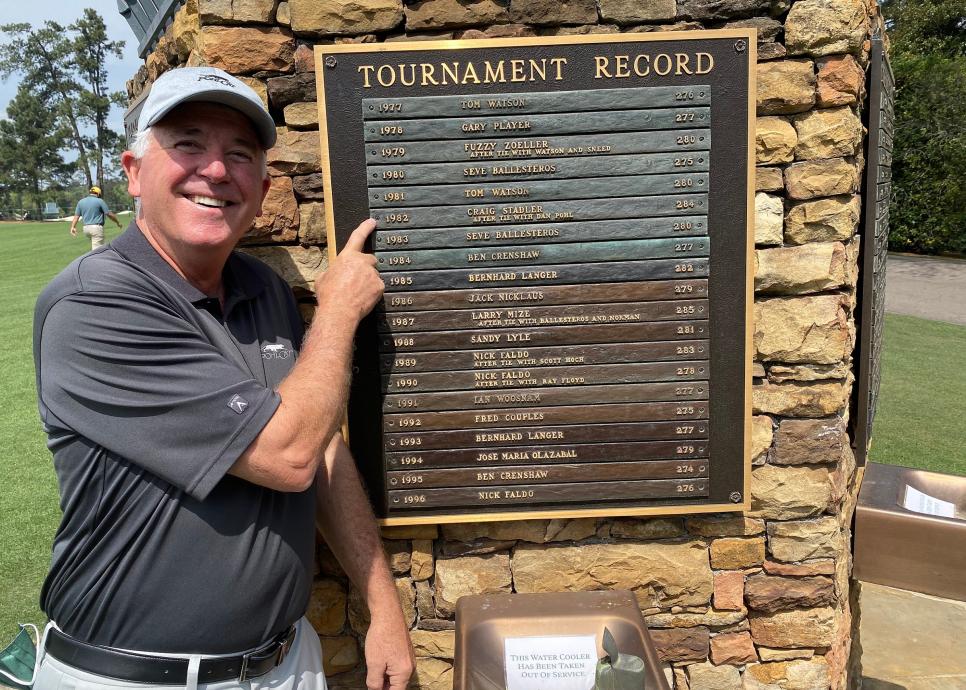
At the plaque on the 17th hole at Augusta, Dan Pohl points out his second-place finish to Craig Stadler in the 1982 Masters.
The Masters is powered by a mystic, abstract current of time. It’s why what occurs in a moment or over a career can have the same spiritual weight, why shots and scores and the players that authored them are codified into the tournament’s history even as they’re being written. What happens across those four days can last forever.
But what happens when your forever is something you don’t want to relive? Where the ending didn’t follow the script and you’re unable to edit it? What is it like to get this close to a dream, and then watch it pass on by?
On Tuesday night of Masters week, those who have won green jackets will convene upstairs at the Augusta National Golf Club for the Champions Dinner, the most exclusive fraternity party in golf. Yet there’s a separate group, a fraternity in its own right. Players who almost had an arm in the jacket, Champions Dinner menus selected in their heads but orders that were never placed.
“There’s part of you that will never get over it,” says Len Mattiace. “It stays in there, deep.” Adds Chris DiMarco: “You become a celebrity for finishing second.”
This class is different from the stars—think Greg Norman, Ernie Els, Tom Kite—who came close to winning but didn’t, and now are eternally outside looking in, for those individuals have other accolades to their name. No, these are the players whose careers, fairly or not, are encapsulated as footnotes to someone else’s fame.
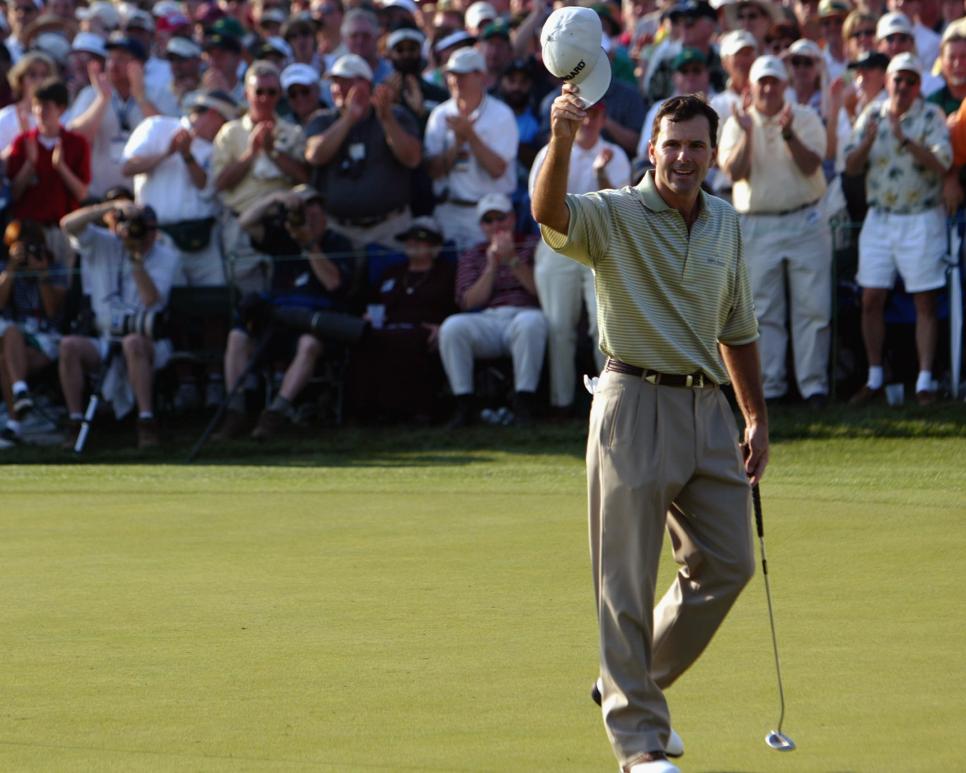
Len Mattiace acknowledges the crowd on the 18th hole of the 2003 Masters.
Getty Images
Mattiace is blessed with this burden. He played in the 1988 Masters as an amateur by making the previous year’s Walker Cup team. Despite a vaunted college career, assimilation into professional life was far from smooth; it took him 15 years to return to Augusta, which he did in 2003.
The power ultimately is with you to make it a good memory, even if it hurts.Len Mattiace
Mattiace didn’t do anything special the first two days, posting a 73 and 74, although a Saturday 69 moved him into the top 10 and five shots back of the lead heading into Sunday. The then-35-year-old pieced together a magical Sunday this tournament routinely boasts, carding six birdies and an eagle through 16 holes to take the lead with two holes to go. But he picked a bad time to hit his first loose shot of the day, his tee ball at the 18th coming to rest behind a pine tree. He had to punch out to bogey to finish with a 65, which put him in a playoff against Mike Weir.
Mattiace then lost another tee shot and was again stymied behind a tree; he doubled, giving the green jacket to Weir. On the green, Mattiace handled himself with grace, but once he was out of range from cameras, he broke down in tears.
“I was made out to be a little guy, but I was a very good player,” Mattiace says. “I had won twice the previous year. I went in with very high confidence and was playing as good as anyone. There are no pretenders at the Masters; you earn your invite.”
In the aftermath, Mattiace found solace that his results were finally living up to what he believed they could be. There would be other days like this. The Masters would be his springboard into the next phase of his career. But later that year Mattiace tore ligaments in his knee while skiing. He still struggled to walk by the time the 2004 Masters came; he missed the cut and hasn’t been back since, realizing years later his Sunday in 2003 would be the only day he would get.
“What do you do with that energy? It was 98 percent of a successful week. When you talk about 98, that is a very, very, very good thing,” Mattiace said. “Otherwise, you can flake out. You can burn out. You can’t do that. Life is bigger.
“It’s easier said than done, especially since people want to talk about it all the time. But the power ultimately is with you to make it a good memory, even if it hurts.”
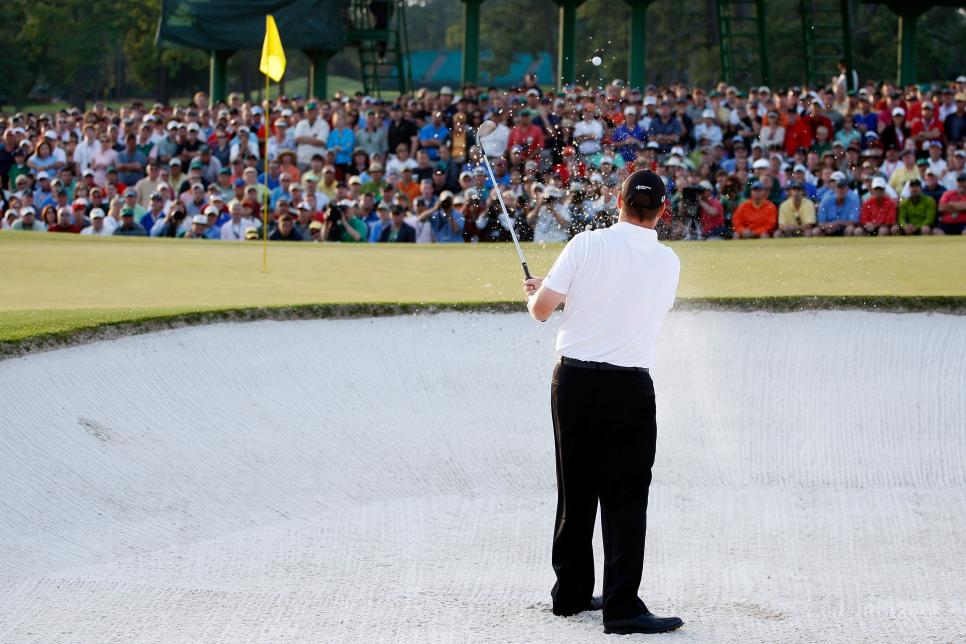
Chad Campbell plays a bunker shot on the first sudden-death playoff hole during the final round of the 2009 Masters.
Jamie Squire
Chad Campbell knows the feeling. The Texan’s resume is one of envy: nearly 500 starts, four wins, three Ryder Cups, over $26 million in earnings. He contended in a handful of majors. The one folks want to discuss most is the 2009 Masters. Campbell led after the first two rounds and was in the penultimate pairing Sunday. He played well, but as he teed off on 18, he was two back, believing his run was over.
However, Kenny Perry made a mess behind him, bogeying the final two holes, placing Campbell in a playoff against Perry and Angel Cabrera. The trio went to the 18th, and Campbell hit a good tee shot, leaving 160 yards and change in. And with both of his competitors in trouble, Campbell had an advantage. But he flared his approach into a bunker, and though his third shot finished at five feet, he could not convert the putt. Both Perry and Cabrera saved par, and the Argentine went on to win.
I try not to beat myself up. I love watching the tournament. It’s such a special place.Chad Campbell
Campbell can’t watch a replay of the 2009 Masters. It has nothing to do with his own performance.
“I had a lot of people come in. Family, friends,” Campbell says. “My wife was there. It’s hard to go back.” He can still see it in his mind, walking off the 18th green and seeing his wife in tears, knowing he can’t do anything to stop them from falling. You have to be strong for them, Campbell says, even as you’re crumbling down on the inside.
Campbell played 10 more years on tour, but appeared in just one more Masters, finishing T-45. He’s not one to live in the past, yet his approach on 18 still lingers.
“I try not to beat myself up,” Campbell says. “I love watching the tournament. It’s such a special place. It was an honor to be a part of it. But it’s hard to want to replay a shot, knowing you can’t.”
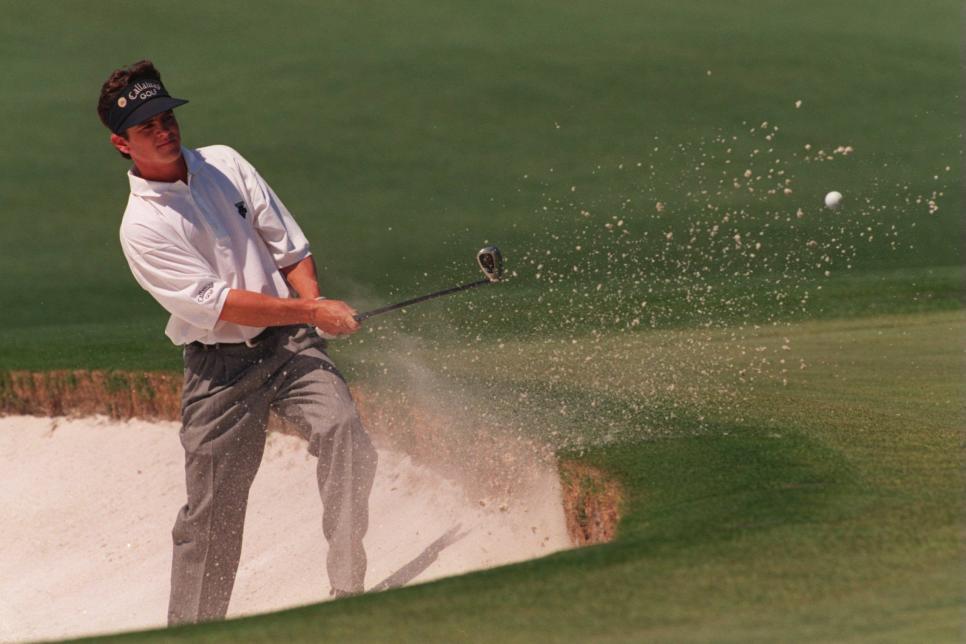
Brian Henninger hits a bunker shot at the second green in the final round of the 1995 Masters.
Stephen Munday
There’s no singular moment that tipped Brian Henninger’s fate. That he was even at Augusta was something of providence: He won a playoff at the 1994 Deposit Guaranty Golf Classic, which rain cut to 36 holes. This was prior to the PGA Tour rules that dubbed a tournament official only after 54 holes, meaning Henninger—a mid-30s, mini-tour legend—received a spot in the Masters field. He made the most of his opportunity, as the short-hitting Henninger was tied with Ben Crenshaw heading into the final round of the 1995 Masters.
Henninger’s story was easy to fall in love with. He played only one year in high school and walked on to the University of Southern California golf team. He hustled his way on the various minor-league circuits of the sport out of his own pocket, reached the PGA Tour in 1993 and promptly lost his card. And now he was 18 holes away from climbing the sport’s summit.
“You know, no one really knew who I was. But me, at the time, I sort of expected to be there,” Henninger says. “I was there for a reason. I wasn’t a huge golf historian, so I wasn’t in awe of where I was at. I had respect for the place, but I was there to compete.”
It's hard because the Masters is always with you. You can't let it go, even if you want to.Brian Henninger
When he thinks about that Sunday, Henninger drifts to the dead time. How do you fill the hours when you’re on the precipice of everything changing? Physically, he was the same guy as Thursday. Emotionally was another beast. Henninger is big on positive affirmation, and that’s what he tried to do. But positivity is hard to maintain after back-to-back bogeys, which Henninger made on the second and third holes. And by the time he made the turn he was five back of Crenshaw. He never threatened on the final nine, finishing in a tie for 10th.
Nevertheless, playing in the final group brings with it certain attention. Henninger wasn’t ready for it. “I didn’t handle it well,” Henninger says. “I got lost. I wasn’t very organized.”
A self-taught golfer, Henninger went down the instruction rabbit hole, trying to keep what he had while adding what he needed. Unfortunately, he lost what he had in the process. He played in only one more Masters, where he missed the cut. Ultimately, his search led him to end his playing days, and he transitioned into coaching.
“It’s hard, because the Masters is always with you. You can’t let it go, even if you want to,” Henninger says. “I don’t live my life like that. I try to move on. I played at the highest level at the greatest venue. It’s life-affirming, truly.
“I love competition, and if you love competition, you have to take failure as much as the accomplishment.”
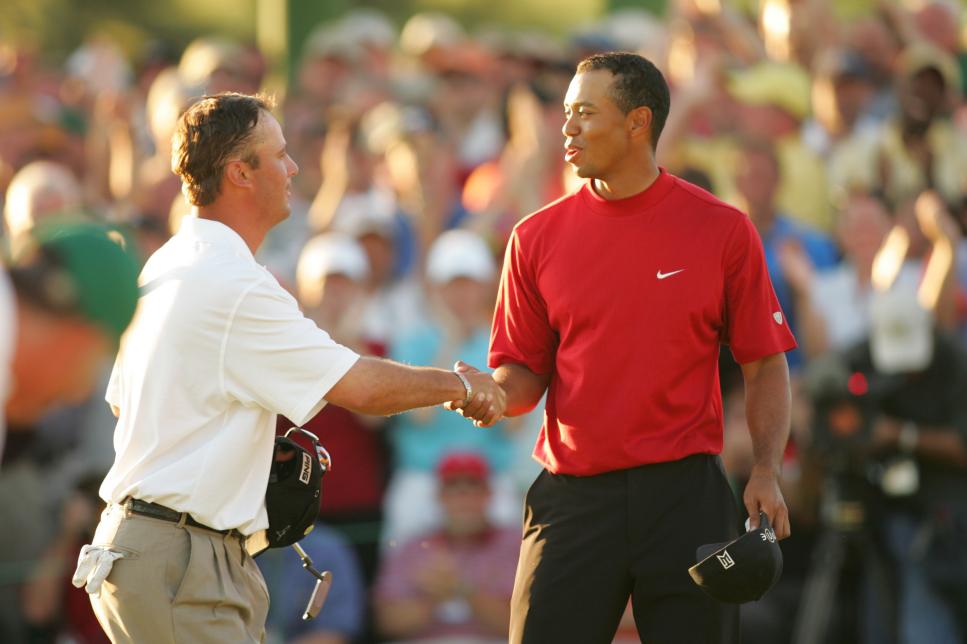
Chris DiMarco and Tiger Woods shake hands after DiMarco made a putt at No. 18 to force a playoff in the 2005 Masters.
Icon Sports Wire
DiMarco has found peace in a similar sentiment. He has runners-up in the Open Championship, PGA Championship and Masters—the latter two via playoffs. The Masters is what has endured in the minds of fans.
DiMarco loved the week. He would drive up from Atlanta with friends, and his friends would walk with him inside the ropes on the Sunday during a practice round. Later in the week, his family would come up. “It’s our biggest tournament, but it’s also this celebration,” DiMarco says. “That can be a distraction, but I loved it.”
It helped that DiMarco always seemed to play well at Augusta, with four finishes of T-12 or better. And he was never better than in 2005. He had a four-shot lead after the second round of a rain-delayed tournament, although he was three behind Tiger Woods at the start of the final 18. That was the day Woods made his chip at the 16th, a shot that became indelible as soon as it dropped. What is forgotten is DiMarco erased a two-shot deficit with two holes to play to force sudden death. Unfortunately for DiMarco, Woods dropped a 15-foot birdie on the first playoff hole.
In some ways, DiMarco says, his defeat is easier to take than others. “You know, it would have been hard if I missed a putt, if I gave it away,” DiMarco says. “I don’t mind that I’m reminded of it so much, because I took the best this game ever saw to 73 holes, and I took his best. I made him earn it. I didn’t back down. That’s something to be proud of.”
But, as DiMarco says, there’s the flip side to that coin. DiMarco only played in two more Masters after 2005, missing the cut in both. He still attends every year, using his PGA of America card that he earned through his tour membership. He goes to appease sponsorship deals and will often take clients out early Sunday morning on the back. As he’s pointing out the nuances of Augusta National, DiMarco says, eventually 2005 crosses his mind.
“That chip doesn’t go in, makes you wonder, right?” DiMarco says. “I’d be inside these ropes instead of watching from the outside.”
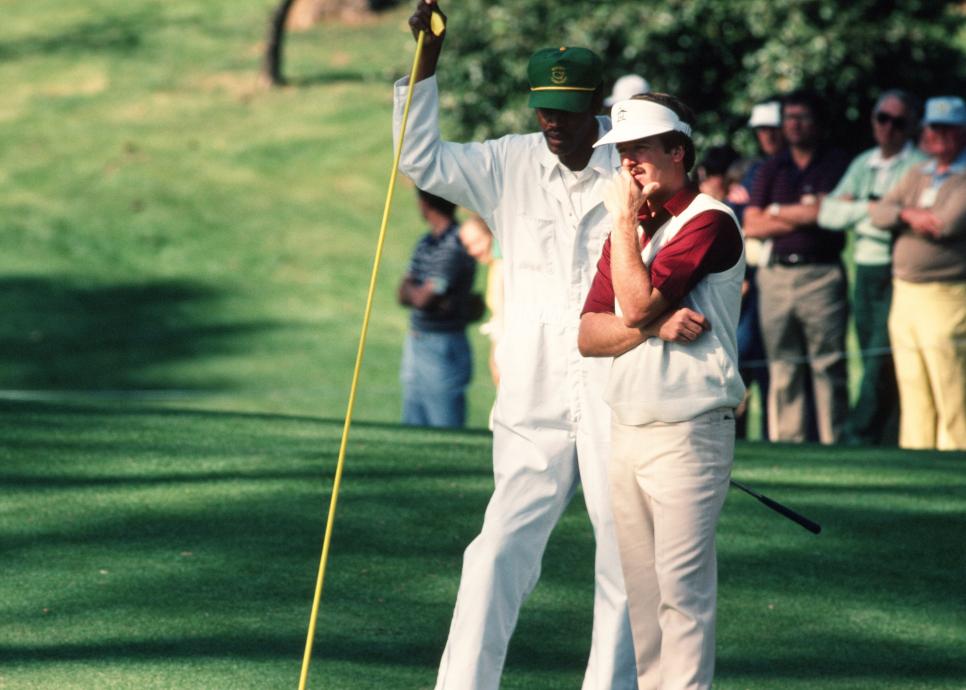
Dan Pohl contemplates his putt on the 10th green of the 1982 Masters.
Augusta National
Pohl barely made the cut at the 1982 Masters with consecutive 75s. Then he did something marvelous on Saturday, going eagle-eagle-birdie-birdie starting at the 13th, becoming the only player to go six under through a four-hole stretch at Augusta. Still, on Sunday he was six shots back of Stadler, who maintained a six-shot advantage with seven holes left. Only Stadler played the final seven in four over, while Pohl turned in another 67 to force a playoff. Starting at the 10th, both men hit good drives, leaving each a 6-iron for the approach.
“I was built for this shot. I was a cutter,” Pohl said. “I couldn’t have dropped my tee shot in a better spot.”
Pohl’s approach went on the wrong side of a ridge; Stadler’s was safely on the right side. After Pohl’s third shot went five feet passed, his par attempt slid by. Stadler, who made par, was too drained to emote, while Pohl was too shocked to know what happened.
“Afterwards, I found out no one got down in two shots from on the side of that ridge,” Pohl said. “It helped, a little. That’s why when people ask if I’d like another chance at that par attempt back, I say, ‘No. I want the approach.’ But honestly, I was young. I came away thinking I’d be back.”
Pohl played well over the next several years, although didn’t come close to contending, and a back injury in 1988 derailed his career. He competed seven more seasons on tour, but his trademark power was gone and his consistency followed suit. When his playing days ended, he opened up his own golf course, the PohlCat, in his hometown of Mt. Pleasant, Mich. He’ll likely watch this year’s Masters from the course as he prepares it for spring.
Pohl’s last Masters appearance was in 1989, where he finished 42nd. Until that day in 2021, he had never made it back to Augusta. The first thing he did was go to the 10th. The volunteer marshal that was supposed to man the rope line abandoned his post, so Pohl thought, “What the hell,” and stepped into the fairway, to the spot he hit his second shot in the playoff, attempting to tussle with a reality that almost was.
“When you’re playing good like I was, you think there’s another day,” Pohl says. “The next year, I came back and I finished eighth. You're always under the impression you’ll get another hand.”
Pohl and his friends left the 10th for the short walk up the hill to the 17th green, and to the fountain that bears his name. Someone from the group snapped a photo of a smiling Pohl pointing to the plate, where he’s destined to be beneath Stadler for eternity. Pohl spent a full day traversing Augusta National, yet his mind never left the 10th.
“I never felt like I choked,” Pohl says towards the end of a conversation. “It just got away.
“I think of that often, What if? Could I have played there every year until I couldn’t? Could I have won more tournaments, more majors? How different is my career? That type of thing never leaves you.”
Then Pohl pauses. He notes some of the friends he took on that Augusta trip have passed, and he was glad he got the chance to share the experience with them. He wants you to know he’s happy, that he’s had a good life. He’s OK if you want to define him for what he’s not.
“Yeah, I’d like to have a green jacket,” Pohl says, “But, man, to even have that what if …”
Pohl doesn’t finish. Sometimes getting the chance to touch a dream is just as good as grabbing it.

